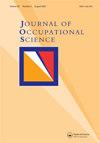Engaging with occupational reconstructions: A perspective from the Global South
IF 2.4
Q1 SOCIAL SCIENCES, INTERDISCIPLINARY
引用次数: 3
Abstract
ABSTRACT The discipline of occupational science informs philosophy and theory in the profession of occupational therapy. It is therefore imperative that the discipline and profession develop a symbiotic relationship that is mutually responsive to the occupational engagement patterns of populations and groups within their respective contexts. Protest is a phenomenon with a long, violent history in South Africa. Protests that are characterised by violence and met with state-sanctioned violence have continued to occur across multiple sectors despite South Africa’s shift from an Apartheid to a Democratic state in 1994. It is of concern that both violence and protest are minimally explored within occupational science and occupational therapy, even though these two phenomena regularly co-occur, impacting the health and well-being of participating citizens. Occupational reconstruction is a concept developed in the Global North that offers an understanding of social activism from an occupational perspective. Decolonial theory reminds us to pay attention to geo-political relations of power and how these influence what is considered as knowledge, who is positioned as knowers, and how context is read. Guided by this framework, I situate myself as a thinker from the Global South and engage with the concept of occupational reconstructions from this position, identifying what this construct might offer research concerned with violence in protest. I consider the case of Rhodes Must Fall (RMF) at the University of Cape Town between 2015 and 2016, noting questions raised by the application of this construct to these protests, the need for context-driven research in occupational science, and implications for the role and scope of occupational therapy practice.参与职业重建:来自全球南方的视角
职业科学学科为职业治疗提供了哲学和理论基础。因此,学科和专业必须发展一种共生关系,在各自的背景下对人群和群体的职业参与模式作出相互反应。抗议在南非是一种有着悠久暴力历史的现象。尽管南非在1994年从种族隔离国家转变为民主国家,但以暴力为特征并遭遇国家批准的暴力的抗议活动仍在多个地区持续发生。令人关切的是,在职业科学和职业治疗中,暴力和抗议都很少被探讨,尽管这两种现象经常同时发生,影响了参与公民的健康和福祉。职业重建是在全球北方发展起来的一个概念,它从职业的角度提供了对社会激进主义的理解。非殖民化理论提醒我们注意权力的地缘政治关系,以及这些关系如何影响被视为知识的东西,谁被定位为知者,以及如何解读上下文。在这个框架的指导下,我将自己定位为一个来自全球南方的思想家,并从这个位置参与职业重建的概念,确定这种结构可能为抗议中的暴力研究提供什么。我考虑了2015年至2016年间开普敦大学罗兹必须倒下(RMF)的案例,注意到将这一概念应用于这些抗议活动所提出的问题,职业科学中情境驱动研究的必要性,以及对职业治疗实践的作用和范围的影响。
本文章由计算机程序翻译,如有差异,请以英文原文为准。
求助全文
约1分钟内获得全文
求助全文
来源期刊

Journal of Occupational Science
SOCIAL SCIENCES, INTERDISCIPLINARY-
CiteScore
4.30
自引率
41.70%
发文量
46
 求助内容:
求助内容: 应助结果提醒方式:
应助结果提醒方式:


